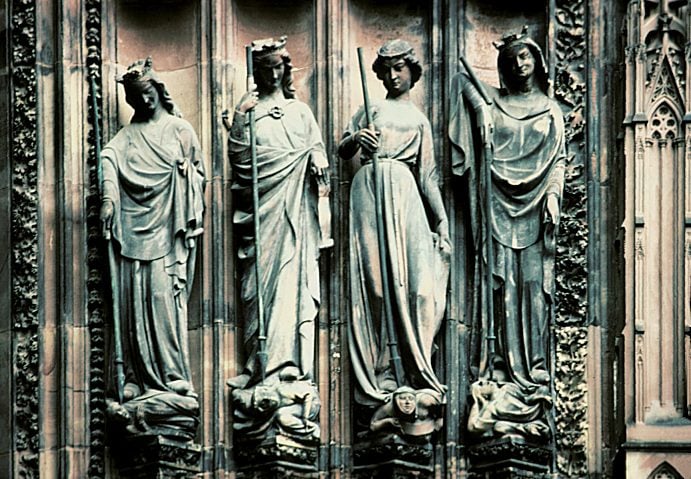When, in a moment of absentmindedness, I practice a virtue, my reaction to the fact is not that “I’m being good,” but “Oh, so this is how it is.” Before the moment of virtue — be it patience or prudence — I stumbled blindly without knowing my blindness. In the light of virtue the universe is illuminated and what was obscure makes sense. Virtue reveals the very consistency of existence.
The virtues are not additions to life, supplementary goodies we tack onto our behavior — they are modes of existence by which we experience truth, that is, the proper relation between ourselves and reality.
The virtue of Justice is not a thing we practice to make situations better, to please others, or to please ourselves. Justice is the habitual disposition of the will to render each and all we encounter their rightful due. Justice, then, is fundamentally an experience of reality, in which we relate to others as they are, having built within ourselves the willingness to experience what each and every human being deserves, that is, the reality of each and every human being.
Prudence is not the pursed frown that clenches at the sight of immorality. It is more than a cleverness that avoids sketchy situations and doesn’t spend too much money on cars. Prudence is “right reason with respect to action” (Aquinas), the essential precondition for each and every good action, “the perception and examination of reality,” and “the art of making the right decision based on the corresponding reality.” (Pieper) What seems like an augmentation to human behavior, upon closer inspection, is revealed to be the very method by which human beings experience the truth about things, reality itself. Prudence is seeing every situation in truth, giving us the power to act in correspondence to reality.
Chastity is not a series of actions designed to keep my pants and “save myself for marriage.” Chastity is the integration of my sexuality with the whole of my person, and integration that neither represses, alters, or enthrones the sexuality as ruler over my actions. The virtue of chastity is a way in which I live as I am, authentically, in wholeness and in truth. The virtue of modesty is a way in which I present my whole person, acting, dressing and living in such a way that I speak my name and reveal my whole self. The virtues are all concerned with setting man in right relation to himself, others, and the cosmos. They are efforts to be who we are.
Humans are mind-boggling things: We experience our lives as projects. We do not simply exist as we are, end of story — as say, the rock exists — rather, we exist with the innate understanding that we must become who we are, that we must “be ourselves,” “find ourselves,” and “act like ourselves” in all authenticity. There is no value scale for rocks, no question of whether a rock is really being “all the rock that it can be.” But for man this is a constant question: “Am I living life to its fullest?” “Am I being myself?” — all of which is precisely the same as asking “Am I existing in reality?” and “Am I living in truth?”
Each and every virtue is a way by which the human person enters into an authentic experience of reality, treating God, others and himself as they are, answering the question “Am I being myself?” with a resounding yes. I trust the virtuous man, not just because I believe he won’t cheat me, but because I understand that he is in right-relation to reality.












